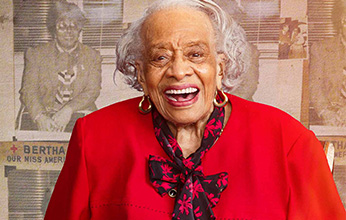She’s Called Simpson House Home Since 2012
Smoothing the transition to technology
These days, we tend to take technology for granted. But in the early days, the tools that were supposed to make our work and lives easier weren’t always so reliable. Fortunately for the Red Cross of Southeastern Pennsylvania, Bertha Bell always believed in having a back-up.
Healthy skepticism saves the day
Before her retirement in 1985, Bertha worked in records management for the chapter’s Blood Division. She was responsible for keeping track of how much blood was on hand, what types, plasma, cryoprecipitate (a plasma product used to control bleeding). All of this information was critical to Red Cross operations. In those days, the Red Cross used a manual system for tracking the blood supply. Bertha helped create the formulas they used. She also maintained the system and trained others to use it—like the women in the movie Hidden Figures did for the space program.
When the Red Cross began using an automated tracking system, Bertha was skeptical. Although her supervisors encouraged her to trust the technology, Bertha continued to keep her own manual journal on the side. One day, when it was time to pull invoices that needed to be sent to healthcare providers on a specific date, it became clear that most of the bills were wrong. The new system hadn’t worked.
Bertha went to a supervisor, privately so as not to embarrass anyone, and let them know about her manual “back-up.” At the time, it was a bold move—for a woman and, especially, for an African-American woman. Her supervisors were both frustrated and grateful. They were able to use Bertha’s journal to retrieve the lost information and fix the invoicing issue.
“She has always tried to do the right thing. She is a fighter for what she believes in,” says her grandson, Rev. David W. Brown, diversity advisor to the Office of the Dean at Temple University and a member of the Simpson Senior Services board of directors.
Walking the walk
A Philadelphia native born in 1920, Bertha has lived a life of service from the beginning—and passed on the lessons she learned.
“She was always the caregiver of the family, caring for her mother even as a teenager, and caring for her sisters as she got older,” her grandson says. “She taught my dad and all of us not to be afraid and to advocate for ourselves.”
Bertha stays abreast of news and politics, and she has always been outspoken about the importance of voting, especially for young people in the African American community. And she has played an active role in making the community a better place to live. In 1987 she was one of the founders of AARP Pennsylvania’s West Park Chapter 4037, recognized in 2017 as one of the international organization’s longest-standing chapters, serving adults ages 50-plus.
For 75 years, she’s worked with Camphor United Methodist Church and was an alto in the Camphor Senior Choir. The group recorded and traveled to sing, and for a time during World War II, Bertha served as choir director. She also helped establish a Nurture Ministry to visit community members who were sick or otherwise homebound. It was while living in Wynnefield and visiting church members there that she became familiar with Simpson House. She became a Simpson House resident in 2012.
“It felt natural, like I was already a part of the community,” Bertha says. As an extension of the Nurture Ministry, she continues to volunteer at Simpson.
Contact us to learn more about Simpson and our amazing communities.
